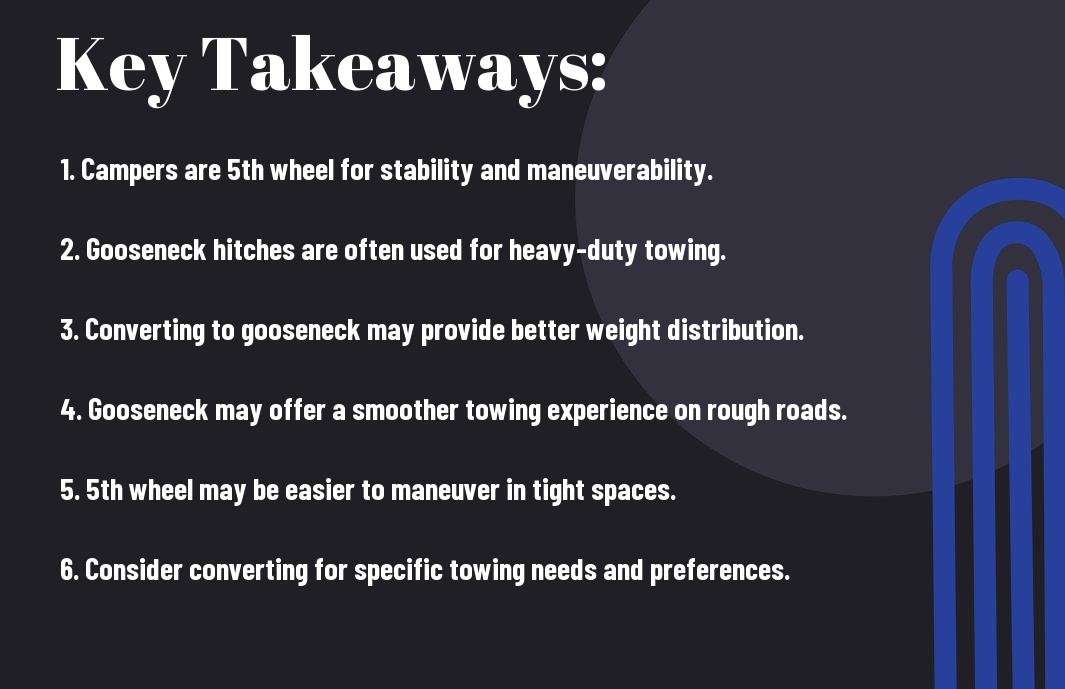Have you ever wondered why most campers are designed for 5th wheel hitches instead of gooseneck hitches? The reason lies in the stability and maneuverability offered by 5th wheel trailers. The unique design of 5th wheel hitches allows for a greater turning radius, making it easier to navigate tight spaces. In addition, the weight distribution is better with a 5th wheel, providing a more stable towing experience. Despite these advantages, you may find yourself needing to convert your 5th wheel to a gooseneck for various reasons. Whether it’s a matter of preference, compatibility with different towing vehicles, or simply wanting to explore the benefits of a gooseneck setup, knowing how to make the switch is essential for any camper owner.
Key Takeaways:
- Stability: Campers are typically 5th wheel and not gooseneck because 5th wheel hitches provide more stability and lower the risk of trailer sway during towing.
- Maneuverability: 5th wheel campers offer better maneuverability compared to gooseneck trailers, making them easier to navigate through tight spaces and narrow turns.
- Weight Distribution: 5th wheel hitches distribute weight more evenly between the truck and the trailer, resulting in a smoother and safer towing experience.
- Storage Space: Gooseneck conversions are sometimes preferred for campers due to the potential for increased storage space in the truck bed.
- Cost: Converting a 5th wheel to gooseneck can be a cost-effective option for individuals who already have a gooseneck hitch installed on their truck.
- Towing Vehicles: Some individuals may have a preference for gooseneck towing due to the availability of trucks with factory-installed gooseneck hitches.
- Personal Preference: Ultimately, the decision to convert a 5th wheel to gooseneck may come down to personal preference, towing habits, and specific camping needs.

The 5th Wheel Hitch: Dominance in the Camping World
Clearly, when it comes to towing a camper, the 5th wheel hitch dominates the camping world. Its unique design and functionality make it a popular choice among campers due to its many advantages over other hitch options. Let’s take a closer look at why the 5th wheel hitch is the go-to choice for many camping enthusiasts.
What Defines a 5th Wheel Hitch?
A 5th wheel hitch is characterized by its design, which consists of a large, horseshoe-shaped hitch that is mounted in the bed of a pickup truck. This design allows for greater stability and control while towing, as the hitch is positioned closer to the vehicle’s axle. The hitch also utilizes a kingpin connection, which provides a secure and reliable attachment point for the camper.
Advantages of a 5th Wheel for Campers
One of the key advantages of a 5th wheel hitch is its ability to provide superior stability and maneuverability while towing. The unique placement of the hitch in the truck bed allows for optimal weight distribution, which results in a smoother and more controlled towing experience. Additionally, the design of the 5th wheel hitch allows for a larger towing capacity compared to traditional ball hitches, making it suitable for larger, heavier campers.
Safety and Maneuverability Considerations
When it comes to safety and maneuverability, the 5th wheel hitch offers enhanced stability and control while on the road. The connection between the hitch and the camper allows for a tighter turning radius, making it easier to navigate through tight spaces and around sharp corners. This can be crucial when maneuvering your camper into a campsite or navigating through challenging terrain. The increased stability also results in a reduced risk of swaying and fishtailing, providing you with a more secure towing experience.
The Gooseneck Hitch: A Strong Contender
Now that you understand the basics of a 5th wheel hitch, let’s take a closer look at the gooseneck hitch. Many campers are turning to gooseneck hitches for their superior towing capabilities and stability on the road. In this section, we will explore the distinguishing features of a gooseneck hitch, practical reasons for choosing gooseneck in other industries, and compare towing capacities and stability.
Distinguishing Features of a Gooseneck Hitch
One of the main differences between a gooseneck hitch and a 5th wheel hitch is the connection point between the trailer and the tow vehicle. A gooseneck hitch uses a ball mounted in the bed of the truck, while a 5th wheel hitch uses a hitch mounted above the truck bed. This difference in connection point allows for tighter turns and better maneuverability when towing with a gooseneck hitch. Additionally, the design of a gooseneck hitch allows for a higher towing capacity compared to a 5th wheel hitch.
Practical Reasons for Choosing Gooseneck in Other Industries
In other industries, such as agriculture and commercial hauling, gooseneck hitches are the preferred choice due to their strength and stability. The design of the gooseneck hitch allows for a more even distribution of weight between the trailer and the tow vehicle, reducing the strain on the truck and improving overall stability. This makes gooseneck hitches ideal for hauling heavy loads, making them a practical choice for a wide range of applications.
Comparing Towing Capacities and Stability
When it comes to towing capacities and stability, a gooseneck hitch often outperforms a 5th wheel hitch. The table below outlines the key differences between the two hitch types:
| Comparison | Gooseneck Hitch |
| Towing Capacity | Higher towing capacity due to the connection point and design |
| Stability | Provides better stability and weight distribution, especially with heavier loads |
As you can see, the gooseneck hitch offers higher towing capacities and improved stability, making it a strong contender for campers considering converting from a 5th wheel hitch to a gooseneck hitch.
From 5th Wheel to Gooseneck: Reasons for Conversion
Your decision to convert your camper from a 5th wheel to a gooseneck might be fueled by various reasons. It’s important to understand the factors that lead individuals to make this switch and the benefits it can bring to your camping experience. Let’s take a closer look at why you might consider converting your camper.
Reasons Why Campers Might Convert
There are several reasons why you might want to convert your camper from a 5th wheel to a gooseneck. One of the primary reasons is the increased stability and improved towing experience that a gooseneck hitch provides. By converting to a gooseneck, you’ll experience reduced swaying and improved control over your camper, especially when navigating difficult terrain or during adverse weather conditions. Additionally, a gooseneck hitch also offers greater maneuverability when compared to a 5th wheel hitch, making it easier to navigate tight turns and narrow spaces.
The Conversion Process: Overview and Potential Challenges
Converting your camper from a 5th wheel to a gooseneck involves several steps, including removing the existing 5th wheel hitch and installing a gooseneck hitch. While the process is relatively straightforward for those with mechanical experience, there are potential challenges that you might encounter. For instance, the structural modifications required for the conversion can be complex and may require professional assistance to ensure safety and stability. Additionally, you’ll need to consider the compatibility of your camper’s frame with a gooseneck hitch, as well as any potential warranty implications.
Conclusion
Presently, campers are designed as 5th wheels instead of goosenecks due to the various advantages of a 5th wheel setup, including greater stability, easier maneuverability, and higher weight capacities. However, if you find yourself needing to convert your 5th wheel to a gooseneck, it could be because of compatibility issues with your towing vehicle, or simply for the convenience of using the same hitch for both your trailer and gooseneck equipment. Regardless of the reason, it’s important to carefully consider the implications and consult with a professional to ensure the safety and performance of your conversion. In the end, the decision to convert from a 5th wheel to a gooseneck ultimately depends on your specific towing needs and preferences.
FAQ
Q: Why are campers 5th wheel and not gooseneck?
A: Campers are often designed to be 5th wheel trailers because this placement allows for better weight distribution and stability during towing. The 5th wheel hitch also allows for tighter turns, making it easier to maneuver the camper in tight spaces.
Q: What are the benefits of converting a 5th wheel to a gooseneck?
A: Converting a 5th wheel to a gooseneck can provide a smoother ride, increased stability, and better weight distribution. Additionally, gooseneck hitches are often easier to hook up and disconnect compared to 5th wheel hitches.
Q: How is a 5th wheel converted to a gooseneck?
A: Converting a 5th wheel to a gooseneck typically involves removing the 5th wheel hitch and installing a gooseneck hitch. This may also require modifications to the camper’s frame and assembly to accommodate the new hitch.
Q: Is converting a 5th wheel to a gooseneck recommended?
A: Converting a 5th wheel to a gooseneck should only be done by experienced professionals and with careful consideration of the camper’s structure and towing capabilities. It is also important to ensure that the conversion complies with any relevant laws and regulations.
Q: Are there any drawbacks to converting a 5th wheel to a gooseneck?
A: While converting a 5th wheel to a gooseneck can offer several benefits, it may also void the camper’s warranty and could impact its resale value. Additionally, improper conversion or installation could compromise the safety and structural integrity of the camper. It is important to carefully weigh the pros and cons before deciding to convert a 5th wheel to a gooseneck.
